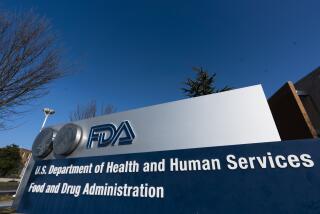Chemotherapy Shortcuts Seen as Threat to Patients’ Lives
Americans are dying unnecessarily of two types of curable cancers because some doctors are not heeding dosage and specified lengths of treatment time for chemotherapy, a researcher announced.
Dr. Vincent deVita, director of the National Cancer Institute, said a review of 2,000 cases over the last 20 years found that reducing chemotherapy for Hodgkin’s disease and diffuse large-cell lymphoma caused a drop in the cure rate.
“The problem is that well-meaning researchers and physicians have tended to reduce chemotherapy doses because of the unpleasant side effects for some patients,” DeVita said at a recent gathering of cancer researchers in Los Angeles.
Type of Lymphoma
Hodgkin’s disease is a type of lymphoma, a malignancy of the lymph nodes and white blood cells, which help the body fight bacteria and other foreign substances.
Together, Hodgkin’s and diffuse large-cell lymphoma account for half of the 40,000 new cases of lymphoma reported in the United States annually.
DeVita estimates that 3,000 people suffering advanced cases of diffuse large-cell lymphoma die annually because they have not received appropriate drug regimens. As many as 1,000 people with advanced Hodgkin’s needlessly die, the doctor said.
In his review, published in the New England Journal of Medicine, DeVita found that a 20% to 25% reduction in chemotherapy for lymphoma patients led to reductions of long-term survival by approximately 20% to 30%.
Importance of Dosage
For cancers that are curable, such as the lymphomas, the dosage intensity of chemotherapy is extremely important, DeVita said. If drug dosages are reduced, lives are lost, he said.
In some instances, doctors have reduced the amount of the drug and extended the period of therapy to help ward off bothersome side effects of cancer treatment at the expense of the patient’s longevity, DeVita explained.
He added that doctors sometimes alter standard chemotherapy regimens when patients complain of hair loss, nausea and the general malaise that usually accompany treatment with cancer-killing drugs.
Amount, Time Period
“Dose intensity is very important in chemotherapy,” DeVita said, adding that drug intensity refers to the amount of a drug administered over the length of time that researchers have deemed most effective in curing specific cancers.
He said studies show that high doses of chemotherapeutic drugs administered over a short period of time are the most effective way to cure lymphomas, adding that neither dose nor treatment time should be changed.
DeVita advises cancer patients to “bug their doctors about getting state-of-the-art treatment.” He said both patients and doctors can call a National Cancer Institute hot line to find out the best treatments for all forms of cancer.






